Interview: Elizabeth Stokes Of The Beths
One of the most anticipated new albums of this year was the second album by The Beths. Titled Jump Rope Gazers, the record was released last week to rave reviews, with a concert at Auckland’s Powerstation making fans smile from ear to ear. We got frontwoman Elizabeth Stokes on the line for an in-depth interview on her creative process.
During the interview Elizabeth digs deep to try and shed light on her creative process. So listen to/or read this fascinating and thoughtful conversation between The 13th Floor’s Marty Duda and the Beths singer/songwriter/guitarist.
Listen to the interview here:
Or, read a transcription here:
M: So congratulations on the new record. I have been listening to it, it sounds like The Beths.
E: That’s heartening.
M: So this is your second album, I was just wondering, did you approach making this record differently than the first one?
E: A little. We talked a lot before making it about things we wanted to do differently and things we wanted to keep the same. The biggest thing we wanted to keep the same was just that we wanted to have it still be the four of us in terms of Jonathan (Pearce) recording and mixing and producing and all that and in the same studio. One of the big differences was just that earlier last year we knocked all the walls down and kind of did the studio up a bit, did a bit of DIY and I meant that the space is now big enough the four of us to be kind of set up at the same time so we were able to track a lot of the songs, most of the songs altogether at least as a base and then we would overdub them on top of that.
G: Gotcha. And speaking of the four of you, so the drumming seat has been in a state of flux, what’s the story there?
E: We’ve been working with Tristan (Deck) for maybe a year and a half now, that’s been really great. Before that we worked with a couple of drummers, Katy and Adam, for just filling in on tours, cause I mean touring isn’t for everybody. Adam’s not in the band anymore.
M: You guys did a lot of touring, there was a lot of excitement about the first album and you ended up going to the states, going to Europe and all that. I wonder if you have any thoughts about that experience as a band and how that may have affected what happens with this record?
E: It’s had a big effect on the band. There was a big culture shift once we started touring where it’s like, you’re around each other twenty four hours a day, it’s so intense and generally we don’t have a driver or a tour manager or anything with us, it’s just the four of us on a bus or in a van or on a plane. The culture shift’s mainly just one where we started to really have to communicate and kind of take care of each other and that has made a big difference to how the band operates generally and it’s made a big difference to how we’ve made this record and how we’ve worked together as a group and rehearse, just in that we’re always trying to always just communicate as well as we can and, yeah that’s it basically.
M: You mentioned that it affected the way you worked on this record, how so? How did working on this record differ from the previous one?
E: The previous one was a lot more fractured cause we were a part time, like a hobby band. Like everyone was working and just being musicians in Auckland and all that so we didn’t get like all together, there would be like a weekend or an afternoon of tracking and then often just me and Jonathan would be there doing overdubs and things like that. It just wasn’t as maybe…it was still collaborative obviously, but this one felt a bit more collaborative just in terms of making sure that everybody was really happy with what they were playing and kind of sharing where the mixes that we’re at or where the overdubs were at any point in time.
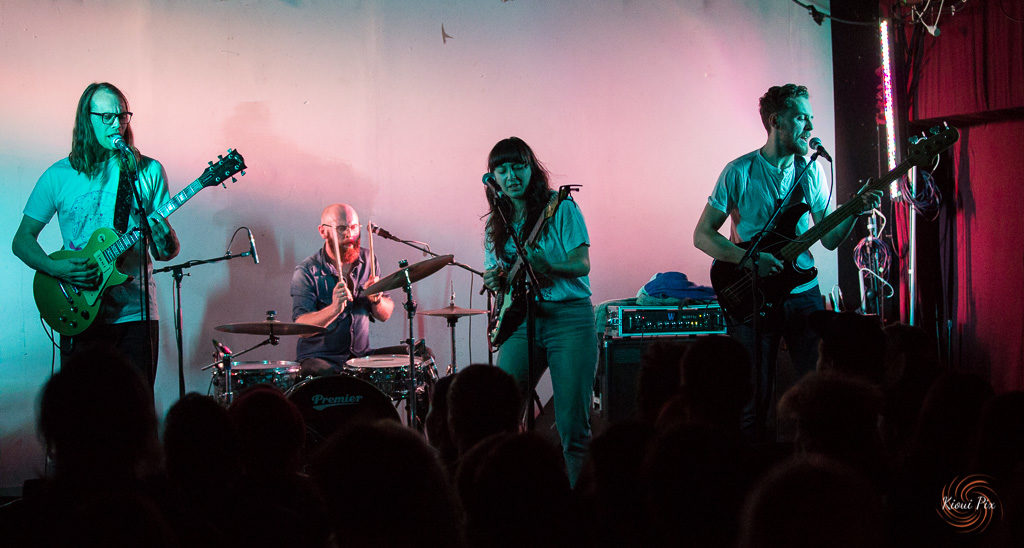
M: I think people might, relatively new to the band, may be surprised to know that you guys have been doing this since 2014, six years ago now, and you were part of a definite little scene playing at the Golden Dawn and at the Wine Cellar and at Lucha Lounge and all that and I assume that’s a different thing that you’re dealing with now.
E: Yeah, it’s very different, it’s kind of a strange time to remember. It’s strange to think that on tour, we’ll play like…if it’s a rough week with no breaks, we’ll play like ten shows or something like that and I just like think about how long it took us to play our first ten shows. In Auckland where it probably took us over a year. It’s very different.
M: When you started the band, did you talk about what you had in mind for the future? Did you have a plan in place or did you just kind of wing it?
E: The plan was to kind of write, for me it was to write music that I liked and to try and write the music that I was wanting to hear. Like I was searching for it and really trying to find, like I think if I’d found someone doing exactly what we were doing, I maybe would have bailed or something so I was trying to make the music that I wanted to hear which was some amalgamation of all the music that I like when I was younger. Yeah, like I wanted to make it and I think I just wanted to play in a band with my friends and to have my own passion project and the fact that people seemed to like it and connect with it. I think we started to see after a year or two, just started to have an inkling that it might be able to go a bit further and I mean, I did start planning like we made plans. They’ve gone well. We don’t make plans because it’s kind of like betting on yourself which feels I don’t know, hard to admit.
M: Right, I understand. My sense is that the main creative collaboration is happening between you and Jonathan and I’m wondering if that is indeed true and if so, why has that happened? What is it between the two of you that connects musically?
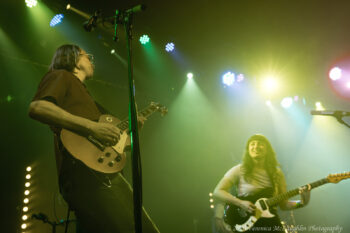 E: There’s something really, in terms of like I see myself as the songwriter in terms of the songs being…I mostly write them on my own and then the arrangement being done as a group. Jonathan, because he’s I guess the producer, he is really the producer as in taking on that role when we’re recording and also when we are arranging like I think production can mean different things and for us, a lot of the production is to do with just like the arranging of the song and going for particular sounds and textures and things like that. I know it’s tricky for him to both be a guitarist in the band which is quite a specific role and then also to try and hold this bigger picture. So we’re all trying to do that as well at the same time but because he is coming at it from the perspective of somebody who wants to record it as well and mix it in the end, I think it’s very special to be able to have him in the band and it’s a real asset and we’re very lucky to have him.
E: There’s something really, in terms of like I see myself as the songwriter in terms of the songs being…I mostly write them on my own and then the arrangement being done as a group. Jonathan, because he’s I guess the producer, he is really the producer as in taking on that role when we’re recording and also when we are arranging like I think production can mean different things and for us, a lot of the production is to do with just like the arranging of the song and going for particular sounds and textures and things like that. I know it’s tricky for him to both be a guitarist in the band which is quite a specific role and then also to try and hold this bigger picture. So we’re all trying to do that as well at the same time but because he is coming at it from the perspective of somebody who wants to record it as well and mix it in the end, I think it’s very special to be able to have him in the band and it’s a real asset and we’re very lucky to have him.
M: I would agree with that, cause I’ve seen him play with all sorts of other people as well like his gigs with Aldous Harding are pretty impressive and he’s playing totally different instruments and doing different stuff and its like what can’t he do?
E: Yeah, he’s a smart man.
M: Now you mentioned that you write the lyrics for the most part and I was listening to the album, the new album, and I released that this is definitely the same person who writes the words for Future Me Hates Me and that. There’s something, a thread running through the way you put your words together and I’m not even sure I can put my finger on it but I was wondering if you could help me.
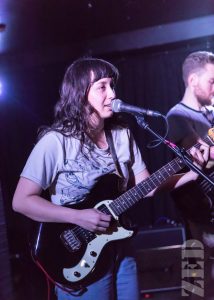 E: It’s hard to explain because I think I understand what you mean and I can tell what words feel right strung together for me. But it’s hard to explain why you put things together the way that you do. I mean, the words have to be something that I feel comfortable saying and feel comfortable singing and I do have a real affinity for words and for the way that they feel when you say them or when you sing them and the rhythm and phrasing and all of it that goes into. That’s not specifically lyrics but I feel like they’re all intertwined in a very specific way. I can’t really explain it either but I do admit that there’s something that makes lyrics feel homey for me where I feel comfortable with them.
E: It’s hard to explain because I think I understand what you mean and I can tell what words feel right strung together for me. But it’s hard to explain why you put things together the way that you do. I mean, the words have to be something that I feel comfortable saying and feel comfortable singing and I do have a real affinity for words and for the way that they feel when you say them or when you sing them and the rhythm and phrasing and all of it that goes into. That’s not specifically lyrics but I feel like they’re all intertwined in a very specific way. I can’t really explain it either but I do admit that there’s something that makes lyrics feel homey for me where I feel comfortable with them.
M: Cause I guess like a song like Future Me Hates Me, you’ve sung that, it must be countless times, and if you’re not comfortable with a phrase that’s in that song, it’s gonna drive you nuts each time right? So you’ve gotta get it right.
E: Yeah. You’re right there, you really have to be comfortable with what you’re saying because you have to sing it over and over and over again.
M: Now, on the new album which is called Jump Rope Gazers, well first of all, what is a Jump Rope Gazer? Is it somebody who’s watching people jump roping? I don’t know.
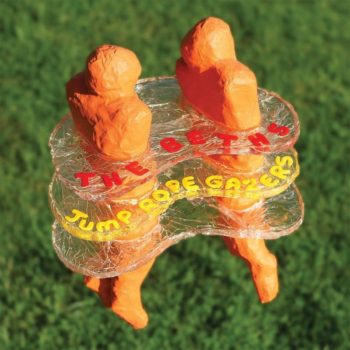 E: Yeah, yup. I don’t know. When I was showing that song to people, like when it was in its demo form or early forms and things like that and then I asked them what it meant, everybody had a different idea of it and I quite like that. I’ve got a quite specific image in my head of what it meant, but the more that I hear other people kind of imagine what it means…it’s just like a silly metaphor. I liked the imagery of it and I think I prefer to leave it so that I don’t rip anyone’s personal meaning away from them and replace it with mine.
E: Yeah, yup. I don’t know. When I was showing that song to people, like when it was in its demo form or early forms and things like that and then I asked them what it meant, everybody had a different idea of it and I quite like that. I’ve got a quite specific image in my head of what it meant, but the more that I hear other people kind of imagine what it means…it’s just like a silly metaphor. I liked the imagery of it and I think I prefer to leave it so that I don’t rip anyone’s personal meaning away from them and replace it with mine.
M: Fair enough, I mean, that’s part of what music’s all about. Everybody has their own idea of what every song that they ever hear, they have a visualization in their head.
E: Even something that seems really obvious like even as a song you might be like it’s very obvious to me what the song’s about, people will interpret it their own way and the more I am alive, the more I notice that it’s the same thing even with conversations where it’s not uncommon to have a conversation with someone where you think you’re talking about one thing and then you find out later that you had completely different understandings of that conversation like and I think it’s the same thing.
M: As much as there is communication in this world with all the different modes of getting hold of people and talking to them, you’re right, it happens all the time. Stuff just misses and goes by and people have come in with their own agenda when they start and it’s hard to shake them from that.
E: Yeah, I think just language, we think of it as an arrow pointing to something that’s concrete, but it’s not. It’s very much, I feel like a conversation is two people kind of two different goos mixing with each other and they never fully integrate.
M: Now getting back to the album, I find that usually I pick out a couple of songs that I want to talk about but I realise that it’s probably more interesting to find out which ones you might be interested discussing, so are there like two tunes that kind of jump out at you that make you want to tell folks more about what they’re hearing?
E: Yeah sure. I mean, there are songs that are very different to the first record, there’s a couple. There is a song called Do You Want Me Now which I think is track five. It’s a song that like…we have in The Beths like, we think of ourselves as quite a formulaic band, I think. We’re ok with that, in terms of normally we build a song in a particular way and it will usually build up, it will have a certain shape where it builds up to a point, reaches a kind of climactic point then comes down from there with some kind of pay off and with Do You Want Me Now, we trying it with that format and it wasn’t really working and we ended up listening to a lot of a particular kind of nineties, simmering soft rock and kind of trying that, like trying it where it kind of simmered along all the way and didn’t really build very much, just maybe with the odd textural change and tried to keep it really sparse and see if you could still get the kind of emotional journey from it without using the tools that we normally use and that we like using like dynamics and things like that. So that was kind of an interesting journey for us. It was quite difficult but in the end, it was something that we were really satisfied with and it felt like it occupies a nice space on the album.
M: Yeah, it kind of stands out because it doesn’t have a big guitar solo in the middle of it and the jangly stuff all around it, it’s kind of quiet and intimate…
E: It does still have a guitar solo.
M: Oh it does.
E: Yeah, but it’s like a chill guitar solo.
M: Oh, ok.
E: So there’s that one and the other big one is Jump Rope Gazers which is the title track which is where the name of the album comes from. That one was kind of scary to write. That’s quite an old one. That song was written before Future Me Hates Me came out as a demo, unfinished. It was kind of scary to write I guess just like an unapologetic love song without the kind of like…I like to usually hide behind humour or irony, just to make me feel better. So it was a little scary to just write something that’s very sincere and earnest and just kind of stand by it and hope it turned out ok and I think worked, I think we like it.
M: And when you perform that live, is that going to be more difficult for you because of that aspect of the song?
E: It’s difficult for me to perform live because it’s maybe the most difficult vocal performance I’ve had to give on the record in terms of, I like wrote, texted my friend who’s a singing teacher and was like, ‘Can you please teach me how to belt like a real singer?’ I wanted to be able to really sing it out and I know that it’s gonna be hard when we first start performing it. Like after a hundred shows you’re fine but yeah, all of us, we’re very challenged by what we’ve written for ourselves on this album and it’ll be hard to play live.
M: Yeah, cause you guys were pretty much playing up until the lockdown weren’t you?
E: Yeah, right in mid-March. One of our, we had a show down in wine country in Marlborough Sounds that got cancelled while we were down there so that was like right, we’re right in the thick of it.
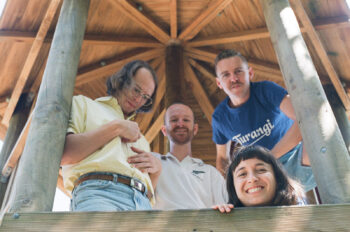 M: Did you do music stuff on your own at home? Were you writing, were you thinking about music? Were you listening to other people?
M: Did you do music stuff on your own at home? Were you writing, were you thinking about music? Were you listening to other people?
E: No. It was pretty…it’s weird, it feels like it was a lifetime ago now but it was pretty… stressful is understating how intense it was, but I maybe wrote one song demo, nah, I wasn’t able to do anything creative really. I played a lot of animal crossing and I did a lot of, there was a lot of work to be done around the album release cause once we decided that we were still gonna go ahead with it, you know there’s getting ready, planning, making videos, doing all the stuff that goes along with an album release but I couldn’t even listen to music really in lockdown.
The Beths new album, Jump Rope Gazers, is out now.